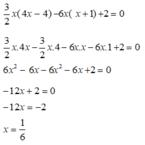
Hãy nhập câu hỏi của bạn vào đây, nếu là tài khoản VIP, bạn sẽ được ưu tiên trả lời.


Mình ko biết đặt biến phụ nên mình sẽ giải bừa :>
\(x^4+4x^3+6x^2+4x+1=0\)
\(\Leftrightarrow x^4+2x^3+x^2+2x^3+4x^2+2x+x^2+2x+1=0\)
\(\Leftrightarrow x^2\left(x^2+2x+1\right)+2x\left(x^2+2x+1\right)+\left(x^2+2x+1\right)=0\)
\(\Leftrightarrow\left(x^2+2x+1\right)\left(x^2+2x+1\right)=0\)
\(\Leftrightarrow\left(x+1\right)^4=0\Leftrightarrow x=-1\)
Thấy ngay x= 0 không phải là nghiệm của pt. Chia 2 vế của pt cho x2 ta được:
\(x^2+4x+6+4.\frac{1}{x}+\frac{1}{x^2}=0\)
\(\Leftrightarrow\left(x^2+\frac{1}{x^2}\right)+4\left(x+\frac{1}{x}\right)+6=0\left(1\right)\)
Đặt \(x+\frac{1}{x}=t\Rightarrow\left(x+\frac{1}{x}\right)^2=t^2\Rightarrow x^2+\frac{1}{x^2}=t^2-2\) Khi đó ta có:
\(\left(1\right)\Leftrightarrow t^2-2+4t+6=0\)
\(\Leftrightarrow t=-2\Leftrightarrow x+\frac{1}{x}=-2\Leftrightarrow x^2+2x+1=0\Leftrightarrow x=-1\)
Vậy pt có 1 nghiệm x = -1

c) \(\left(x+1\right)\left(x+2\right)\left(x+4\right)\left(x+5\right)=40\)
\(\Leftrightarrow\)\(\left(x^2+6x+5\right)\left(x^2+6x+8\right)-40=0\)
Đặt \(x^2+6x+5=t\) ta có:
\(t\left(t+3\right)-40=0\)
\(\Leftrightarrow\)\(t^2+3t-40=0\)
\(\Leftrightarrow\)\(\left(t-5\right)\left(t+8\right)=0\)
\(\Leftrightarrow\)\(\orbr{\begin{cases}t-5=0\\t+8=0\end{cases}}\)
Thay trở lại ta có: \(\orbr{\begin{cases}x^2+6x=0\\x^2+6x+13=0\end{cases}}\)
(*) \(x^2+6x=0\)
\(\Leftrightarrow\)\(x\left(x+6\right)=0\)
\(\Leftrightarrow\)\(\orbr{\begin{cases}x=0\\x+6=0\end{cases}}\)\(\Leftrightarrow\)\(\orbr{\begin{cases}x=0\\x=-6\end{cases}}\)
(*) \(x^2+6x+13=0\)
\(\Leftrightarrow\)\(\left(x+3\right)^2+4=0\) (vô lý)
Vậy......

c) (x+1)(x+2)(x+4)(x+5)=40
<=> (x+1)(x+5)(x+2)(x+4)=40
<=>(x^2+6x+5)(x^2+6x+8)=40
Đặt x^2+6x+5=y
=>y(y+3)=40
=>y^2+3y=40<=>y^2+2.\(\frac{3}{2}\)y+\(\frac{9}{4}\)=40+\(\frac{9}{4}\)<=> (y+\(\frac{3}{2}\))2=42,25<=> y+\(\frac{3}{2}\)=6,5 hoặc -6,5
Bạn tự làm tiếp nha :333
a)x4 - 4x3 - 19x2 +106x - 120 = 0
=>x4 -2x3 -2x3+4x2 -23x2 +46x +60x - 120 = 0
=>x3(x-2) -2x2(x-2) -23x(x-2) +60(x-2)= 0
=>(x3- 2x2 -23x+ 60)(x-2) =0
=>(x3 - 3x2 +x2 -3x -20x+60)(x -2) = 0
=>(x2 +x -20)(x-3)(x-2) = 0
=>(x2 -4x +5x -20)(x-3)(x-2) = 0
=>(x+5)(x-4)(x-3)(x-2) =0
=>x= -5; 4; 3; 2
b)=>4x4 -4x3 +16x3 -16x2 +21x2 -21x +15x -15= 0
=>(x-1)(4x3 +16x2 +21x+15)= 0
=>...bạn tự làm phần tiếp theo nhé
c)Làm giống nguyễn thị ngọc linh

a) ( 3.x + 1 ) . ( 7.x + 3 ) = (5.x-7 ) . ( 3.x + 1 )
<=> ( 3.x + 1 ) . ( 7.x + 3 ) - ( 5.x - 7) . ( 3.x + 1 ) = 0
<=> ( 3.x + 1 ) . ( 7.x + 3 - 5.x + 7 ) = 0
<=> ( 3.x + 1 ) . ( 2.x + 10 ) = 0
<=> \(\orbr{\begin{cases}3.x+1=0\\2.x+10=0\end{cases}\Leftrightarrow\orbr{\begin{cases}x=\frac{-1}{3}\\x=-5\end{cases}}}\)
Vậy x = { \(\frac{-1}{3};-5\)}
b) x2 + 10.x + 25 - 4.x . ( x + 5 ) = 0
<=> ( x + 5 )2 -4.x . (x + 5 ) = 0
<=> ( x+ 5 ) . ( x + 5 - 4.x ) = 0
<=> ( x + 5 ) . ( 5 - 3.x ) = 0
<=> \(\orbr{\begin{cases}x+5=0\\5-3.x\end{cases}\Leftrightarrow\orbr{\begin{cases}x=-5\\x=\frac{5}{3}\end{cases}}}\)
Vậy x = \(\left\{\frac{5}{3};-5\right\}\)
c) (4.x - 5 )2 - 2. ( 16.x2 -25 ) = 0
<=> ( 4.x-5)2 -2 .( 4.x-5) .( 4.x + 5 ) = 0
<=> ( 4.x -5 )2 - ( 8.x+ 10 ) . ( 4.x -5 ) = 0
<=> ( 4.x -5 ) . ( 4.x-5 - 8.x - 10 ) = 0
<=> ( 4.x - 5 ) . ( -4.x - 15 ) = 0
<=> \(\orbr{\begin{cases}4.x-5=0\\-4.x-15=0\end{cases}\Leftrightarrow\orbr{\begin{cases}x=\frac{5}{4}\\x=\frac{-15}{4}\end{cases}}}\)
Vậy x = \(\left\{\frac{5}{4};\frac{-15}{4}\right\}\)
d) ( 4.x + 3 )2 = 4. ( x2 - 2.x + 1 )
<=> 16.x2 + 24.x + 9 - 4.x2 + 8.x - 4 = 0
<=> 12.x2 + 32.x + 5 =0
<=> 12. ( x +\(\frac{1}{8}\) ) . ( x + \(\frac{5}{2}\)) = 0
<=> \(\orbr{\begin{cases}x+\frac{1}{6}=0\\x+\frac{5}{2}=0\end{cases}\Leftrightarrow\orbr{\begin{cases}x=\frac{-1}{6}\\x=\frac{-5}{2}\end{cases}}}\)
Vậy x = \(\left\{\frac{-1}{6};\frac{-5}{2}\right\}\)
e) x2 -11.x + 28 = 0
<=> x2 -4.x - 7.x + 28 = 0
<=> ( x - 7 ) . ( x - 4 ) = 0
<=> \(\orbr{\begin{cases}x-7=0\\x-4=0\end{cases}\Leftrightarrow\orbr{\begin{cases}x=7\\x=4\end{cases}}}\)
Vậy x = { 4 ; 7 }
f ) 3.x.3 - 3.x2 - 6.x = 0
<=> 3.x. ( x2 -x - 2 ) = 0
<=> 3.x. ( x - 2 ) . ( x + 1 ) = 0
<=> \(\orbr{\begin{cases}x-2=0\\x+1=0\end{cases}\Leftrightarrow\orbr{\begin{cases}x=2\\x=-1\end{cases}}}\)
\([x=0\) \([x=0\)
( Lưu ý :Lưu ý này không cần ghi vào vở : Chị nối 2 ý đó làm 1 nha cj ! )
Vậy x = { 2 ; -1 ; 0 }


Ta có : \(x^4-4x^3+6x^2-4x-15=0\)
=> \(x^4-3x^3-x^3+3x^2+3x^2-9x+5x-15=0\)
=> \(x^3\left(x-3\right)-x^2\left(x-3\right)+3x\left(x-3\right)+5\left(x-3\right)=0\)
=> \(\left(x-3\right)\left(x^3-x^2+3x+5\right)=0\)
=> \(\left(x-3\right)\left(x^3+x^2-2x^2-2x+5x+5\right)=0\)
=> \(\left(x-3\right)\left(x^2\left(x+1\right)-2x\left(x+1\right)+5\left(x+1\right)\right)=0\)
=> \(\left(x-3\right)\left(x+1\right)\left(x^2-2x+5\right)=0\)
=> \(\left(x-3\right)\left(x+1\right)\left(x^2-2x+1+4\right)=0\)
=> \(\left(x-3\right)\left(x+1\right)\left(\left(x-1\right)^2+4\right)=0\)
Mà \(\left(x-1\right)^2+4>0\)
=> \(\left(x-3\right)\left(x+1\right)=0\)
=> \(\left[{}\begin{matrix}x-3=0\\x+1=0\end{matrix}\right.\)
=> \(\left[{}\begin{matrix}x=3\\x=-1\end{matrix}\right.\)
Vậy phương trình có tập nghiệm là \(S=\left\{3;-1\right\}\)
Phương trình tương đương:
\(\begin{array}{l} {x^4} - 4{x^3} + 6{x^2} - 4x + 1 = 16\\ \Leftrightarrow {\left( {x - 1} \right)^4} = 16\\ \Leftrightarrow {\left[ {{{\left( {x - 1} \right)}^2}} \right]^2} - \left( {{2^2}} \right) = 0\\ \Leftrightarrow \left[ {{{\left( {x - 1} \right)}^2} - {2^2}} \right]\left[ {{{\left( {x - 1} \right)}^2} + {2^2}} \right] = 0\\ \Leftrightarrow \left[ \begin{array}{l} {\left( {x - 1} \right)^2} = 4 \Leftrightarrow \left[ \begin{array}{l} x - 1 = 2\\ x - 1 = - 2 \end{array} \right. \Leftrightarrow \left[ \begin{array}{l} x = 3\\ x = - 1 \end{array} \right.\\ {\left( {x - 1} \right)^2} = - 4 (VN) \end{array} \right. \end{array}\)